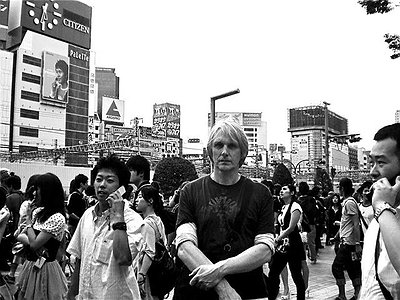God is in the detail
When it comes to playing music on the radio, what are your criteria for quality? What are currently your main challenges and ambitions?
I play a lot music that I don't specifically like, or would listen to over and over again at home. The programme that I do now is a good example of that. 95% of what I play each week, I've discovered in that week. I'm looking for new music all the time. When I found a piece of music it used to be "what can I play after this?" but now it's "what can I play on top of this?" I play 3 or 4 things on top of each other. Again, 1+1 creates 3. The main criteria is how it all fits together.
The challenge is to create something that people will want to listen to again and again. I try to make a programme that would work with no presentation whatsoever. I'm convinced that every show I do right now, you could take all the presentation out and it would still work. The presentation is no longer meant to be informational, it's on top of what is already there. What's already there should be sufficient in itself. I don't like the idea that the person on the radio is there to instruct you in any way. I like the idea of creating something that people can sink into. I've felt what ever I did should be listenable on various levels. The first level is that it can be on in the background. I've never really wanted to people to stop what they're doing and listen to me now, you know. I don't make it with consideration as to what people will be doing when they're listening. The flow of the music is not going to make you switch off. The second level is to make sure that there's enough going on, if someone is actually paying close attention, to keep their attention, not the same old boring stuff like where the song was recorded.
Once I did an interview with Miles Davis. It wasn't planned because he hardly ever gives interviews and it was live. I wanted to ask him about his clothes, because every time you see Miles Davis he's wearing the most amazing clothes. I've only ever seen 3 or 4 people in the world, Grace Jones, Patti Smith and Miles Davis would be one of those people, who can wear anything, they never disappear behind the clothes. When Grace Jones wears Gaultier she's still Grace Jones. But when other people put it on they disappear underneath the clothes. So I eventually I asked Miles about his clothes, and you couldn't stop him. It was like he'd been waiting 40 years for someone to finally ask him this question. He started with his trousers, saying he goes to Japan once a year to get these trousers made, and talked about his house in Los Angeles that's got another house next to it that's full of clothes. He said he's got so many clothes that he could live to be 100 playing a concert every single night and he would still not get around to wearing them all. And then he said that, "that's crazy isn't it?". People couldn't understand why I asked him about his trousers, but it revealed so much about him. I've always felt that if you can somehow conjure out of someone's head, especially in a live interview, what they're thinking about at that moment, no matter how banal it is, that it will tell you so much about them. God is in the detail.
What do you really need a radio programme to do? If you're trying to appeal to as many people as possible, it needs to have a little bit of this and that. I've seen people compile programmes starting off with a male singer, then putting in a female singer, then a group...because they need a structure, something to hang it on and something to blame if it doesn't work. I like the feeling that each time you do something there's an element of risk involved. When I started out with Night Flight, it was all pretty normal, music - presentation - music. It was only when I started to think more about what I was doing that things changed. I don't like the idea of doing a pre-recorded show that sounds live. It's internet-only radio, so anyone that has a computer can listen. I don't need to say what I'm playing because there's a list and anyone listening can simply look it up. I don't need to waste time on talking about who or what's playing. Previously music was holy, I would never speak over it, but it's not so precious now. It was partly out of reverence but also because what I played was often quite rare and people would be recording the songs. But now, it's not like that, there's no beginning, middle and ending, now I speak all over the place if I want, if it fits of course. The form is developing. I'd like to think I'm taking full advantage of the benefits of pre-recorded radio.
With the proliferation of podcasts and online radio, many programs have shed DJs in favour of programs comprised exclusively of music. What, do you feel, is lost? What, to you, is the role of the presenter in music radio – and in which way can (s)he add to the listening experience?
Instead of doing my programme, I could publish online the 15 or 20 songs that I'm going to play this week with what I might say about them in between using Spotify or whatever. Everything is available, why would anybody want to listen to the radio at all if they can get what they want anywhere, anytime. My programme can't be put online as a podcast because of German copyright laws, the company would have to pay every time the music was played. It's not like that everywhere. I think the great thing about digital technology is that you can get the digital links and keep it as archives.
I play things on top of each other and I edit things because in that form you can only hear it there. I was offered to make the whole show, but I turned them down because I need the expertise of the engineer. I want his input, another set of ears to work on the programme. To me, a podcast should have more than just the music. I'm trying to present something that's more than just functional and should have some individuality.
Especially in music journalism, radio has long mostly been considered a medium for information and promotion. In which way, however, is and should there also be an artistic aspect to your work?
MTV used to be nothing more than promo clips for music, essentially advertisements. Video was an advertisement for something. A lot of what was and is put on the radio is simply a promotion of the latest music and records. That needs to change. But at least with the Internet, people are getting the opportunity to hear more music. You can at least listen to the songs before you buy them.
In terms of artistic merit, I'd love to be a musician and create something from nothing, but I'm not and I create something from what's already there. It's second hand creativity, but I have an ability to fit music together.








